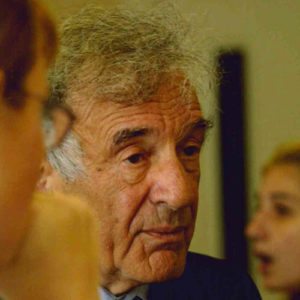Dr. Elie Wiesel was an inspiration in many ways, but the word I associate the most with him is testify. Years before I had the opportunity to hear him speak and then eventually take two Winter Term classes with him, I remember reading his book Night in eighth grade. The words written on those pages stayed tucked away in my mind, but they never left me. During my senior year of high school, I had the opportunity to visit Auschwitz and was haunted by the silence, the stillness and the injustice of what had happened decades before. In the years since, I have felt similar emotions on visiting other places of mass atrocities, including the Killing Fields in Cambodia. The experience I had in Auschwitz led me to pursue an independent study on the Rwandan genocide and the U.S. response to it during my freshman year at Eckerd College. Before I had even encountered him as a teacher, Dr. Wiesel’s voice was shaping not only my moral compass but a large part of my worldview and what I wanted to do with my life.
Even though I associate the word testify with speaking, in class, Dr. Wiesel would sit back and encourage the students to do most of the talking. This was not by any means a passive move. He was actively encouraging us to find our voices and not be afraid to use them, to engage in dialogue and even challenge each other on points of disagreement in ways that still respected the integrity of the person we were disagreeing with. Toward the end of college, several students and I organized a campus campaign to raise awareness around the genocide taking place in Darfur, Sudan. After this experience, we were invited to speak to high school students at the Florida Holocaust Museum. I cannot adequately convey how much Dr. Wiesel’s work—not just literary but his force as an internationally acclaimed peacemaker—inspired my passion to advocate for refugees and those involved in mass conflicts.
In recent days as I feel bombarded with images of gun violence, racism and terrorism, I continue to be reminded of Dr. Wiesel’s voice, his desire to speak up against oppression, inequality and the kind of power that makes global leaders blind to their people’s suffering. Today, seven years after leaving Eckerd College, I am working for an organization called Soccer Without Borders, a nonprofit that serves refugee and immigrant students in Baltimore. I have had the privilege to meet incredible and resilient people—from Syria, Iraq, Eritrea, the Democratic Republic of the Congo, Sudan, Somalia, El Salvador, and the list could go on. The fact that this list is so extensive tells me there is still a lot of cruelty and hatred in the world. However, one of the main qualities that resonated the most with me about Dr. Wiesel was his ability to hold firmly to hope, even when the world could seem cold and ruthless.
Dr. Wiesel was fiercely adamant against neutrality, and this stance led me, a person who is generally conflict-averse, to understand that we cannot afford to not speak up, to not testify when we notice actions occurring that perpetuate darkness and not light. Thank you, Dr. Wiesel, for your call to testify and bear witness as you have inspired countless others to follow suit. I hope more people will find it in their hearts to listen to your message, and I am eternally grateful to have been your student.
—Stephanie Wolfe ’09


